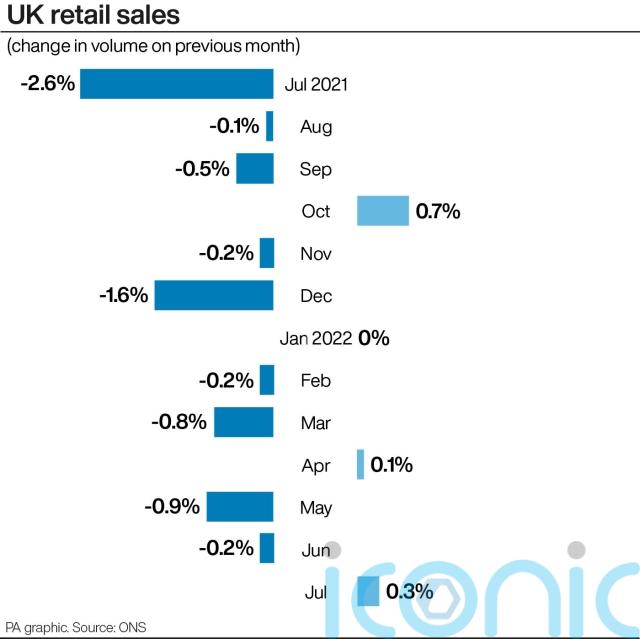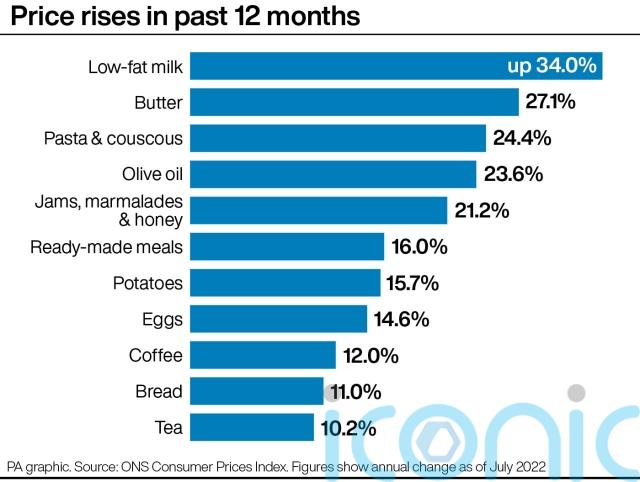
UK retail sales picked up in July but continued to show longer-term signs that consumers are making cutbacks to save money amid soaring inflation, according to official figures.
Sales lifted by 0.3% in July, significantly higher than economists’ expectations of a 0.2% drop, the Office for National Statistics reported.
But sales fell by 1.2% in the three months to July, reflecting a gradual decline in spending since the previous summer as the cost-of-living crunch squeezes people’s wallets.

A revision of June’s retail figures also put sales slightly lower, at a 0.2% drop rather than 0.1%, showing that shopping activity was slower than previously thought.
Darren Morgan, director of economic statistics at the ONS, said: “Retail sales nudged up very slightly in July, but looking at the longer-term picture, they are continuing the downward trend which started last summer.
“Clothing and household goods sales declined again, with feedback continuing to indicate consumers are cutting back due to increased prices and concerns around affordability and cost of living.”
Online sales picked up in July with retailers reporting that a range of offers and promotions had boosted spending during the summer months, Mr Morgan added.
But fuel sales dropped by 0.9%, suggesting that the recent spell of very hot weather meant fewer people were choosing to travel, the ONS said.
Food store sales rose by just 0.1% in July, a decline from the revised 2.7% increase in June when grocery spending was boosted by the Queen’s Platinum Jubilee weekend.
Retail sales volumes rose slightly by 0.3% in July 2022 following a fall of 0.2% in June 2022.
Retail remains 2.3% above its pre-pandemic level https://t.co/bnFf9PyzYw pic.twitter.com/grlMcDPpcm
— Office for National Statistics (ONS) (@ONS) August 19, 2022
Higher food prices and the impact of cost-of-living affordability concerns have dragged down sales in recent months, retailers told the ONS.
However, specialist food stores such as butchers and bakers saw sales jump by 4.7% over the month.
Meanwhile, alcohol and tobacco stores saw sales drop by 8.7%.
UK inflation hit 10.1% in July, rising above economists’ expectations, the ONS reported on Wednesday.
But consumer price inflation for the poorest tenth of households was even higher, at 10.9%, compared to 9.4% for the richest tenth of households, according to calculations by the Resolution Foundation.

The “cost-of-living gap” reflects less well-off households spending a greater share of their budgets on food and energy bills, it said.
George Lagarias, chief economist at accounting firm Mazars said: “The bad news is that consumers remain pressured and looking for solutions to cut back expenditure.
“The good news is that they still have a real appetite to spend to maintain their living standards, even as cost rises bear down on them.
“This means that if headline inflation recedes soon, it will have caused no permanent damage to the consumer psyche, allowing trade to return to its pre-cost-of-living crisis standards quickly.”
Subscribe or register today to discover more from DonegalLive.ie
Buy the e-paper of the Donegal Democrat, Donegal People's Press, Donegal Post and Inish Times here for instant access to Donegal's premier news titles.
Keep up with the latest news from Donegal with our daily newsletter featuring the most important stories of the day delivered to your inbox every evening at 5pm.